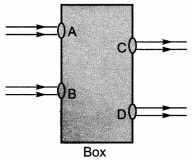Class 10 for MCQ Science Chapter 10 Light- Reflection and Refraction
Question 21:
Two big mirrors A and B are fitted side by side on a
wall. A man is standing at such a distance from the wall that he can see the erect
image of his face in both the mirrors. When the man starts walking towards the
mirrors, he finds that the size of his face in mirror A goes on increasing but that
in mirror B remains the same:
(a) Mirror A is concave and mirror B is
convex
(b) Mirror A is plane and mirror B is concave
(c) Mirror A is concave
and mirror B is plane
(d) Mirror A is convex and mirror B is concave
Answer
Answer: (c) Mirror A is concave and mirror B is plane
Question 22:
In optics an object which has higher refractive
index is called
(a)
Optically rarer
(b)
Optically denser
(c)
Optical density
(d)
Refractive index
Answer
Answer: (b) Optically denser
Question 23:
Beams of light are incident through the holes A and
B and emerge out of box through the holes C and D respectively as shown in the
figure. Which of the following could be inside the box?

(a) A rectangular glass slab
(b) A convex lens
(c) A concave lens
(d) A
prism
Answer
Answer: (a) A rectangular glass slab
Question 24:
Refractive index:
(a) Depends on
the wavelength of light used to measure
(b) Is actual property of the
substance
(c) Depends on the angle of incidence
(d) None of these
Answer
Answer: (a) Depends on the wavelength of light used to measure
Question 25:
A ray of light is travelling in a direction
perpendicular to the boundary of a parallel glass slab. The ray of light:
(a) Is
refracted towards the normal
(b) Is refracted away from the normal
(c) Is
reflected along the same path
(d) Does not get refracted
Answer
Answer: (d) Does not get refracted
Question 26:
The optical phenomena, twinkling of stars, is due
to
(a) Atmospheric
reflection
(b) Total
reflection
(c) Atmospheric
refraction
(d) Total
refraction
Answer
Answer: (c) Atmospheric refraction
Question 27:
Which of the following statements is true?
(a) A
convex lens has 4 dioptre power having a focal length 0.25 m
(b) A convex lens
has -4 dioptre power having a focal length 0.25 m
(c) A concave lens has 4
dioptre power having a focal length 0.25 m
(d) A concave lens has -4 dioptre
power having a focal length 0.25 m.
Answer
Answer: (a) A convex lens has 4 dioptre power having a focal length 0.25 m
Question 28:
A hunter wants to shoot a fish whose image can be
seen through clear water. It is to be aimed:
(a) Below the image of fish
(b)
Above the image of fish
(c) Directly towards the image
(d) In any direction
Answer
Answer: (a) Below the image of fish
Question 29:
A ray of light passes from a medium X to another
medium Y. No refraction of light occurs if the ray of light hits the boundary of
medium Y at an angle of:
(a) 120o
(b) 90o
(c)
45o
(d) 0o
Answer
Answer: (b) 90o
Question 30:
Convex lens focus a real, point sized image at
focus, the object is
placed
(a) At
focus
(b) Between F and
2F
(c) At
infinity
(d) At 2F
Answer
Answer: (c) At infinity